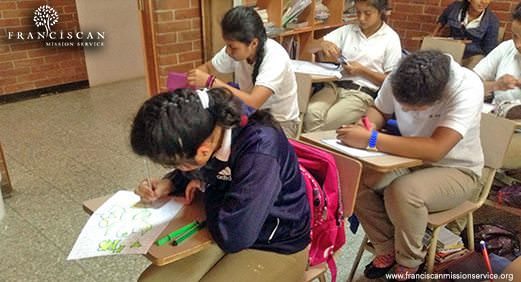100 Paper Cranes

Editor’s Note: Missioner Maeve Gallagher reflects on how she holds on to hope even in the face of terrible things happening all over the world.
Here’s what they tell you before you go on mission: you will miss a lot of life events of your friends and family. Birthdays, weddings, baptisms, births. It will be hard to see those pictures on social media, but you celebrate with them from afar and send them well wishes, prayers, and love.
Here’s what they don’t tell you: that you will miss mass shootings, police violence, rape cases, hate filled presidential races, biased judges, biased police, biased governments. And that is harder to watch. It makes you mad, then sad, then hopeless because you’re surrounded by pain and violence in both your host and home country.
Because you hear bullets outside your apartment from the gangs in your aldea and you might as well be in Chicago because what’s happening here is happening there. You watch la policía alternate between strictly enforcing small offenses against the young and poor and turning a blind eye to the corruption of the rich and powerful and wonder why the US holds itself in such high esteem when it perpetuates the same things.
You see the effects of Guatemala’s recent civil war and genocide. The war criminals continue to escape justice and the people are left without their fathers, brothers, and sons, some never knowing what happened to them when the military “disappeared” them. And you know that the ancestors of America’s slaves are waiting for their own answers. It appears that for many people black lives actually don’t matter, or at least they don’t matter as much as a white one.
You know about the high rates of rape and sexual abuse in the country where you live, among the students you work and live with, and you read about an American boy who expresses no remorse for violating an unconscious woman at a frat party after he’s sentenced to a mere six months in jail because the judge and parole officer think his future is too precious to tarnish with more jail time.
You observe all of this for a year and a half and you feel helpless. There’s pain in your home in Guatemala, in your home in Chicago, and in places you’ve never been: Istanbul, Belgium, Syria, Iraq, South Sudan, and on and on. It overwhelms you and you wake up some days not wanting to face the world and its latest tragedy. You’d rather stay in bed.
You remind yourself that there is good in the world. You need to believe that there is good. You hear about Muslims donating blood to Pulse victims during Ramadan fasts, Canadians welcoming refugees into their homes, protesters calling for police reform, the Pope visiting genocide sites. You see a student helping a classmate with a difficult math problem, the look of pride on a teen’s face when she understands your question and responds in English, a student who whispers in your ear that she wants to teach English someday too, a child cleaning up a mess someone else made without complaining.
These good moments are more subtle, quieter. They don’t cancel out the angry, violent ones, but they send out their own kind of light and they bring you peace for a moment. But that peace is so fragile and can be destroyed with the news of another innocent death, shooting, suicide bomb, or drone strike. You start to think it will always be like this. Has it always been like this?
You read constantly. You read anything you can find on the internet hoping that maybe if you understand the problem you can somehow fix it. You know it’s a stupid thought, but you have so little control over your life that you’re desperate. You’ve become such a “go with the flow” person during your time on mission but part of you aches for order amidst so much chaos.
One day you discover the Museum of Tolerance in Los Angeles. You learn that they are collecting paper cranes to educate people about the Holocaust. You remember a small book you picked up in 5th grade about Sadako Sasaki who developed cancer from the atomic bomb the U.S. dropped on Hiroshima when she was two years old. She followed the Japanese tradition that taught if a person made 1000 origami paper cranes she would be granted one wish.
She died before she could complete all her cranes. You remember crying at the end of the book. At age ten you understood that a girl of twelve died because of a war she had nothing to do with. You cried harder when you read that her classmates finished the cranes for her. And that’s the paradox, isn’t it? During every evil thing that happens on this planet, there’s always a bit of hope hidden beneath the rubble.
I’m clinging to that hope, to my belief that despite all the hatred there is goodness. Recently in my classes we decorated and folded over 100 paper cranes to send to the Museum of Tolerance. The museum is collecting 1.5 million cranes to commemorate the 1.5 million children who died during the Holocaust. The cranes have become an international symbol of peace and hope.
My students are excited about the possibility that their art may be displayed in a museum in the US. But they’re more excited that they get to spread the message of peace in a world that needs it.
These girls are not naive. They know all too well about violence and pain, prejudice and hate. At Valley we try so hard to create a safe space for them, but the psychological effects of the stresses they face are visible.
So what will a few pieces of paper do? Will it magically bring world peace? No. But maybe it brings peace for a few minutes to my students. Coloring and folding a piece of paper is something that they have total control over and for 45 minutes they have structure and peace and that is unspeakably precious.
I believe that art has power. I believe that children and teenagers have power. I believe that women have power. I believe that minorities have power. I believe that teachers have power. I don’t have any solutions to the world’s problems, but I know that when we speak out against injustice we harness our power.
If you’d like to join my students and others who are working to make sense of a violent world, then create and send origami paper cranes to the Museum of Tolerance. I’ve learned so many things during my time as a missioner, including that we are more powerful when we work together than by ourselves.
I refuse to stay in my bed all day, even when it hurts to read the news or hear about another tragedy here or abroad, because hatred holds no power over me. I have hope.
Reflection Question: What are the moments or the people in your day that bring you hope?
Tagged in:


